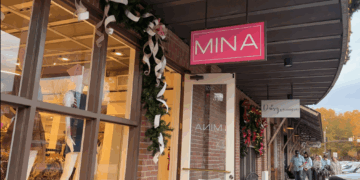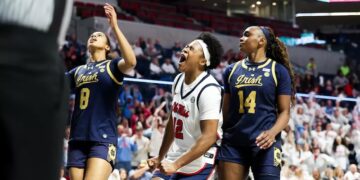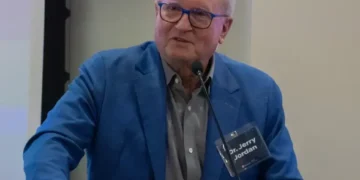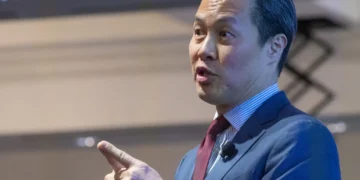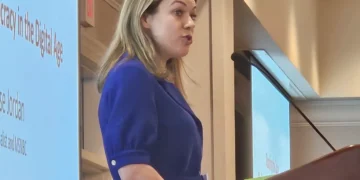Red and blue balloons floated behind a life-size cutout of President Donald Trump in the foyer of Bryant Hall. Handouts with titles such as “Great Myths of the Great Depression” and “50 Wacky Ways the Government Spends Your Money” were laid out on a table.
The new Ole Miss Turning Point USA chapter was hosting a lecture by Matthew Hurtt, from the Americans for Prosperity Foundation — a nonprofit associated with a conservative political advocacy group. Hurtt’s talk was titled “Shackled By Debt,” and he argued that “generations of government spending has made the millennial generation the most debt-laden in the world’s history.”
The talk matched Turning Point USA’s worldview. Turning Point is a national conservative organization aiming to “identify, educate, train and organize students to promote the principles of fiscal responsibility, limited government, and free markets.” The national group, which says it has student chapters at more than 1,000 universities, is probably best known for its “Professor Watchlist,” a website identifying professors who Turning Point claims “advance leftist propaganda in the classroom.”
The Ole Miss chapter, which started this semester, has more than 200 likes on Facebook and 68 active members on MSync, according to Ole Miss Turning Point president Elizabeth Hildenbrandt, a senior biology major from Conroe, Texas. The group sets up a table twice a week outside of Weir Hall, handing out “Socialism Sucks!” buttons and stickers. It has also hosted a “Free Speech Ball,” in which participants celebrated the First Amendment by writing whatever they wanted on a 12-foot inflatable ball, and a “Safe Space Day,” in which juice boxes, goldfish crackers, coloring books and pacifiers were available for passersby.
“We like things that catch attention,” said Kolyn Lowe, Ole Miss Turning Point vice president and junior biology major from Olive Branch. “We like controversy.”
At the Hurtt lecture, the all-female Ole Miss Turning Point executive board members smiled while welcoming guests to put their names into a raffle for a Starbucks gift card.
A year ago, these women were strangers.
“We started working on this last January, and none of us knew each other,” Lowe said. “All four of us reached out to our regional director and she put us in contact with each other.”
The beginnings of Turning Point at Ole Miss actually date back further, to when Lowe and Hildenbrandt were in community college and high school. Lowe said the organization’s founder, Charlie Kirk, followed her on Twitter, so she looked at his feed and found the political organization.
Hildenbrandt also became interested in Turning Point after following Kirk on Twitter.
“We don’t politically side,” Hildenbrandt said. “We’re a conservative grassroots movement, but we’re non-partisan. And our conferences actually have Independents, Libertarians, Republicans and everyone.”
Yet, she said, Turning Point members agree that big government is not the solution to the nation’s problems.
“Our catchphrase is ‘Socialism Sucks!’ because it does – it kills a lot of people,” Lowe said. “Our biggest argument is Venezuela, because if you look at Venezuela, the guy in charge is living it up. He has gained weight the past few years, and all of the people under him are suffering. They have rationed food, toothpaste — they have nothing there, and people are starving.”
Political science department chair John Bruce said that such negative perceptions of socialism aren’t new.
“For 15 to 20 years, I can get a reaction out of the class if I talk about socialism,” Bruce said. “But if I give a three-question quiz about socialism, they’ll probably fail it. The Republican party has used the phrase ‘socialism’ to attack policies of the left.”
Anthropology assistant professor Marcos Mendoza said the group’s “Socialism Sucks!” slogan tries to lump together the vastly different varieties of socialism that exist.
He said Turning Point’s logic is “crudely binary,” because it assumes people are either “makers,” meaning that they’re enterprising individuals who produce value for society, or “takers,” meaning that they’re dependent on big government or involved in corruption between large companies and the government.
Mendoza also said their stances often bleed into social issues in their publications and partnerships. He said the organization has argued the gender wage gap is a myth and downplayed the statistics of sexual assault on college campuses.
Lowe said she thinks Turning Point is “really cool” because it focuses less on social issues and more on fiscal issues.
“College students are going to understand the fiscal issues more than the social issues because they’re not as hot-button issues and not as emotionally fired,” Lowe said.
With the “Safe Space Day” event, Lowe said Turning Point wanted to show the “ridiculousness” of the concept.
“If someone has serious mental issues that they need to deal with, they should go see a doctor or counselor instead of going to a safe space where they’re surrounded by people who will tell them that their life is perfect,” Lowe said.
The term “safe space” refers to campus areas designed to be free of criticism, bias, conflict and threatening ideas. Valeria Ross, director of the UM Office of Leadership and Advocacy, said the Ole Miss campus is an intended safe space and includes numerous resources where students can find a person to speak with or find assistance in feeling safe.
Brenna Paola, vice president of UM Pride Network, said that, in theory, the “Safe Space Day” could’ve been offensive but she said it was childish and immature in implementation.
“UM Pride Network has bigger things to worry about, like HB 1523,” Paola said, referring to the state law that would allow businesses to turn away customers based on their “sincerely held religious beliefs or moral convictions.”
Lowe said the idea for the “Safe Space Day” and the “Free Speech Ball” came from a handbook that national Turning Point organization sends to all of their chapters. Hildenbrandt also said the ball, “Safe Space Day” supplies and all décor were donated.
“We don’t really pay for anything,” Lowe said. “They fund speakers on campus. If we travel, we can get a travel stipend, and they paid for all the supplies for Safe Space Day, all of our stickers, buttons and food at our chapter meetings.”
College Democrats treasurer Alec Ashby said he thinks it’s amusing that Turning Point, which shouts “Socialism Sucks,” would take handouts from national organizers who have been credited with raising “dark money” from conservative special interest groups.
“We find it disingenuous to seek funding from billion-dollar organizations and wealthy elites to influence politics on our campus instead of raising money like every other campus organization does, with hard work and local fundraising,” Ashby said.
Ole Miss’ chapter of Turning Point also hosts its own events, such as a “Pumps and Politics” date party and “Fiesta Finances,” in which members 21 and over go to El Mariachi and drink margaritas, talk about the budget and bond with each other. Ole Miss Turning Point’s next event “Capitalist Day” will allow members to celebrate capitalism by going shopping.
“Because Ole Miss is so Greek-life oriented, we were trying to come up with events that would get people interested and make it fun,” said Jennifer Robinson, Ole Miss Turning Point digital director.
Ole Miss Turning Point members Brady Cole, sophomore Arabic major, and Caetlind Moudy, sophomore religious studies and Arabic double major, said the club meetings are pretty “central” in regard to ideology.
“There’s definitely not hate toward anybody,” Moudy said. “It’s totally a safe space for political discussion.”
Lowe said the Office of Leadership and Advocacy made the process of becoming a registered club harder than necessary in an attempt to shut down conservative voices on campus. Ross, director of the office, said the steps Turning Point had to follow to become officially recognized weren’t any different from the steps other organizations have to go through.
“I am a stickler for protocols and procedures, everything consistent,” Ross said. “And for this organization, I applied policies consistent with how I apply them to other organizations. I want to help them be successful.”
Lowe said the group struggled to find a faculty adviser and that Turning Point asked 50 faculty members to be its adviser before associate history professor Marc Lerner agreed. Lerner said he is no longer the adviser.
Lerner said he originally agreed to become the adviser because he believes that all students should have the opportunity to form organizations, but he was not involved with the group otherwise.
“It’s hard to be a conservative on a college campus,” Lowe said. “The university tries to stop you at every corner they possibly can.”
She said there’s no diversity of thought on campus.
“Students are fed these lines from professors that they trust, and they don’t really question it,” Lowe said. “You should have a real conversation instead of taking what your professor says and running with it.”
Hildenbrandt said the “Professor Watchlist” only lists “questionable actions” that have been reported and verified by third parties. Conservative news website “Campus Reform” and Turning Point’s news publication “Turning Point News” are often cited as third-party evidence.
Assistant professor of sociology James Thomas said he submitted his own name and coursework as part of a nationwide movement of professors trying to overload the Watchlist server last year.
Thomas said the movement began when people started to notice that most professors identified on the list were people of color or those who teach programs emphasizing minorities – such as Queer Theory, African American, Latin and Women and Gender Studies.
“It’s very specifically targeting people who don’t teach the traditional white male canon,” Thomas said. “The reality to me is this is just another manifestation of 21st century white supremacy, we’re going to hide our whiteness around ideals of conservatism.”
Hailey Henderson, junior political science major, said she’s seen and been involved in plenty of classroom debates – all of which had a pretty even divide between “parties.”
“I have never seen a professor even truly participate in these debates. They will periodically present arguments from either side of the aisle to stimulate the conversation,” Henderson said. “I’ve seen my professors present arguments that I know they didn’t believe in, in order to force the student to think critically and defend their stance.”









